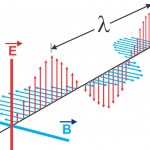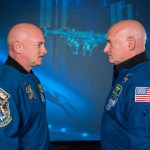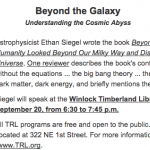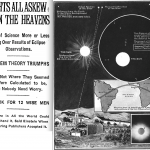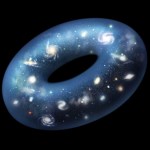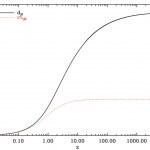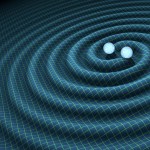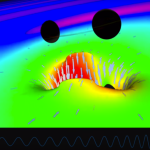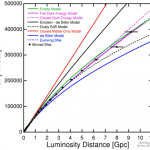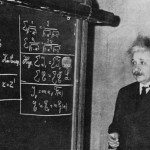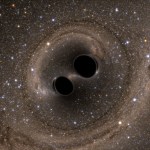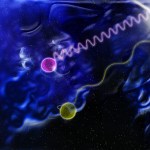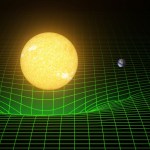Relativity
"Each ray of light moves in the coordinate system 'at rest' with the definite, constant velocity V independent of whether this ray of light is emitted by a body at rest or a body in motion." -Albert Einstein, 1905
The more kinetic energy you impart to something, the faster you go. But there’s a limit: the speed of light in a vacuum. In fact, if you have any mass at all, you’ll never reach it; if you have no mass, it’s the only speed you can travel at. But why is it finite instead of infinite? Why does it have the particular value it has? And why couldn’t it be faster or slower under different…
"It is old age, rather than death, that is to be contrasted with life. Old age is life's parody, whereas death transforms life into a destiny: in a way it preserves it by giving it the absolute dimension. Death does away with time." -Simone de Beauvoir
If you want to describe your location here on Earth, only two values are usually sufficient: one for your latitude and one for your longitude. This is because the surface of the Earth is two dimensional, and you’re generally not either underground or airborne; if you are, a third value, representing your altitude, is also necessary.
On the…
"Each ray of light moves in the coordinate system 'at rest' with the definite, constant velocity V independent of whether this ray of light is emitted by a body at rest or a body in motion." -Albert Einstein, 1905
The idea of relativity, that there's no "absolute rest frame" where the laws of physics are special, has been around since Galileo. If you think about a moving train firing a cannonball, that's Galilean relativity: a person on the train would see the cannonball move at a different speed from a person on the ground.
A French 320 mm railway gun, used during World War I.
But if you…
“Everyone has his dream; I would like to live till dawn, but I know I have less than three hours left. It will be night, but no matter. Dying is simple. It does not take daylight. So be it: I will die by starlight.” –Victor Hugo
Whether you’re at rest or in motion, you can be confident that — from your point of view — the laws of physics will behave exactly the same no matter how quickly you’re moving. You can move slowly, quickly or not at all, up to the limits that the Universe imposes on you: the speed of light.
Light, in a vacuum, always appears to move at the same speed -- the…
"Its continuing mission: to explore strange new worlds, to seek out new life and new civilizations, to boldly go where no one has gone before." -Star Trek, in many incarntions
When Star Trek debuted 50 years ago, we didn’t know that there would be regions of the Universe that were forever inaccessible to humanity, nor that there would be galaxies permanently unreachable to us, even if we managed to develop near-light-speed travel technology. Yet thanks to the existence and dominance of dark energy today, that’s exactly the case. The only workaround, it appears, would be to develop faster-than…
“We must free ourselves of the hope that the sea will ever rest. We must learn to sail in high winds.” -Aristotle Onassis
Welcome back to the end of another big week at Starts With A Bang! There's been a lot of fantastic stories that have gone down, including:
Can stars escape from the galaxy, with planets intact? (for Ask Ethan),
Fossilized relic discovered by Hubble is a link to the Milky Way's past (for Mostly Mute Monday),
Is the cosmic distance ladder flawed?,
That's no comet; that's Pluto!,
How certain are we of the Universe's 'Big Freeze' fate, and
Was Earth…
“Astronomers are greatly disappointed when, having traveled halfway around the world to see an eclipse, clouds prevent a sight of it; and yet a sense of relief accompanies the disappointment.” -Simon Newcomb
Next year, on August 21st, 2017, millions of Americans will delight in the first total solar eclipse to go from coast-to-coast in 99 years. The path of totality will range from Oregon to South Carolina, giving more than two minutes of the Sun being blocked by the Moon’s shadow to all along its central path.
Image credit: Mir / RSA, 1999, of the Moon's shadow falling on Earth, during a…
"For once you have tasted flight you will walk the earth with your eyes turned skywards, for there you have been and there you will long to return." -Leonardo da Vinci
The Universe is an awfully big place, but how certain are we that we couldn’t travel in a straight line for a very long time and simply return to our starting position? Just because we can travel through the Universe for an arbitrarily, perhaps infinitely long distance-or-time, doesn’t mean the Universe itself is infinite. It’s quite possible that it closes in on itself, and that any straight-line path will eventually return…
"They say the universe is expanding. That should help with the traffic." -Steven Wright
Look out at a nearby object in our Universe, and you'll find that the amount of time you look back (in years) is pretty much exactly equal to the object's distance (in light years). But look far away, and these two numbers start to diverge. In our 13.8 billion year old Universe, in fact, we can see back up to 46 billion light years in any direction. If you think this number seems absurd, you're not alone.
The GOODS-N field, with galaxy GN-z11 highlighted: the presently most-distant galaxy ever discovered…
“A human being is part of a whole, called by us the Universe, a part limited in time and space. He experiences himself, his thoughts and feelings, as something separated from the rest a kind of optical delusion of his consciousness. This delusion is a kind of prison for us, restricting us to our personal desires and to affection for a few persons nearest us. Our task must be to free ourselves from this prison by widening our circles of compassion to embrace all living creatures and the whole of nature in its beauty.” -Albert Einstein
If you're talking to someone across the same room, what the…
"Find a place inside where there's joy, and the joy will burn out the pain." -Joseph Campbell
One of the cardinal rules of a black hole is that anything that falls inside the event horizon -- that crosses that invisible boundary -- can never escape. That's because the escape velocity from inside the event horizon is greater than the speed of light in a vacuum, c, a speed that nothing in this Universe can exceed.
In flat space, it's easy to set up an infinite series of observers that all agree on the speed of light at different locations. Image credit: PixaBay user PixelAnarchy.
But in…
"We shall not cease from exploration, and the end of all our exploring will be to arrive where we started and know the place for the first time." -T.S. Eliot
Now that not just one but two gravitational wave events have been directly detected, we're officially in the era of true gravitational wave astronomy. LIGO has taught us something unique about stellar mass black holes, and will continue to teach us about these objects, their population statistics, and their merger rates as time goes on.
Image credit: Bohn et al 2015, SXS team, of two merging black holes and how they alter the appearance…
"It turned out that nature was very kind, and there appear to be many of these black holes in the Universe and we were lucky enough to see one." -Dave Reitze, executive director of LIGO
On September 14th, 2015, just days after turning on, the twin Advanced LIGO detectors detected the first gravitational wave signature: a merger between two black holes, of 36 and 29 solar masses. They inspiraled, they merged, and they lost 5% of their rest mass to gravitational radiation, sending ripples through the fabric of space due to Einstein’s E = mc^2. It raised a whole slew of questions: were these…
“If everything seems under control, you’re not going fast enough.” -Mario Andretti
One of the toughest things to wrap your mind around in the natural world is the idea of special relativity: the faster you move, the closer you get to the speed of light, the more difficult it becomes to increase your speed at all. While you might approach the speed of light arbitrarily and asymptotically, you’ll never reach it.
Public domain timelapse photo by flickr user comedynose (Pete), illustrating fast, relativistic motion. Image retrieved via https://www.flickr.com/photos/comedynose/23696582553.
And…
"Science is global. Einstein's equation, E=mc^2, has to reach everywhere. Science is a beautiful gift to humanity, we should not distort it." -A.P.J. Abdul Kalam
Over 100 years ago, Einstein shook up the physics world with a number of groundbreaking discoveries: special relativity, brownian motion, the photoelectric effect, and his most famous equation, E = mc^2. This mass-energy equivalence underlies everything from antimatter to atomic bombs to the process that powers the Sun.
The longer a photon's wavelength is, the lower in energy it is. But all photons, regardless of wavelength/…
"The first amazing fact about gravitation is that the ratio of inertial mass to gravitational mass is constant wherever we have checked it. The second amazing thing about gravitation is how weak it is." -Richard Feynman
One of the strangest, most novel predictions of Einstein's relativity is that mass would not only curve space, but that the curved space would act like a lens. Background light traveling past this mass would become magnified, distorted and stretched. In some cases, arc, multiple images or even perfect, 360º rings would occur.
This image illustrates a gravitational lensing…
"When I was in high school, I was certain that being an astronaut was my goal. It was a very important time -- Sally Ride was making her first flight into space and she had a real impact on me. Those 'firsts' kind of stick in your head and really become inspirations for you." Karen Nyberg, astronaut
On September 14th, less than 72 hours after being activated at its highest sensitivity ever, the Laser Interferometer Gravitational wave Observatory (LIGO) detected its first unambiguous signal in both detectors, a signal that corresponded to the merger of two massive black holes: 36 and 29…
"If you are not completely confused by quantum mechanics, you do not understand it." -John Wheeler
Now that LIGO has detected gravitational waves directly, it's time to examine all the different sources that they come from, and what they can teach us about the Universe. While accelerating masses in strong gravitational fields -- black holes, neutron stars and the like -- will produce gravitational waves capable of being seen by direct detection experiments, there's another class of gravitational waves that's observable through its effects on the leftover light from the Big Bang: gravitational…
"The fundamental choice is not whether humans will have faith, but rather what the objects of their faith will be, and how far and into what dimensions this faith will extend." -Matt Emerson
Writing in the Wall Street Journal, Matt Emerson asserts that science is faith-based, since scientists believe that the predictions of their theories will be borne out. It's true that faith, by definition, is the belief in an outcome for which we cannot be certain. Indeed, we could not have been certain that LIGO would have found gravitational waves, nor that Einstein's predictions for their properties…
“You asked me how to get out of the finite dimensions when I feel like it. I certainly don't use logic when I do it. Logic's the first thing you have to get rid of.” -J.D. Salinger
Now that gravitational waves have been verified to exist, and the first black hole-black hole merger has been definitively detected by LIGO, it's time to start thinking of the next steps in gravitational wave astronomy. The biggest one we can dream of, perhaps the holy grail of this field of study, is to go beyond General Relativity itself, and to find evidence that gravitation is a truly quantum theory at its core…
